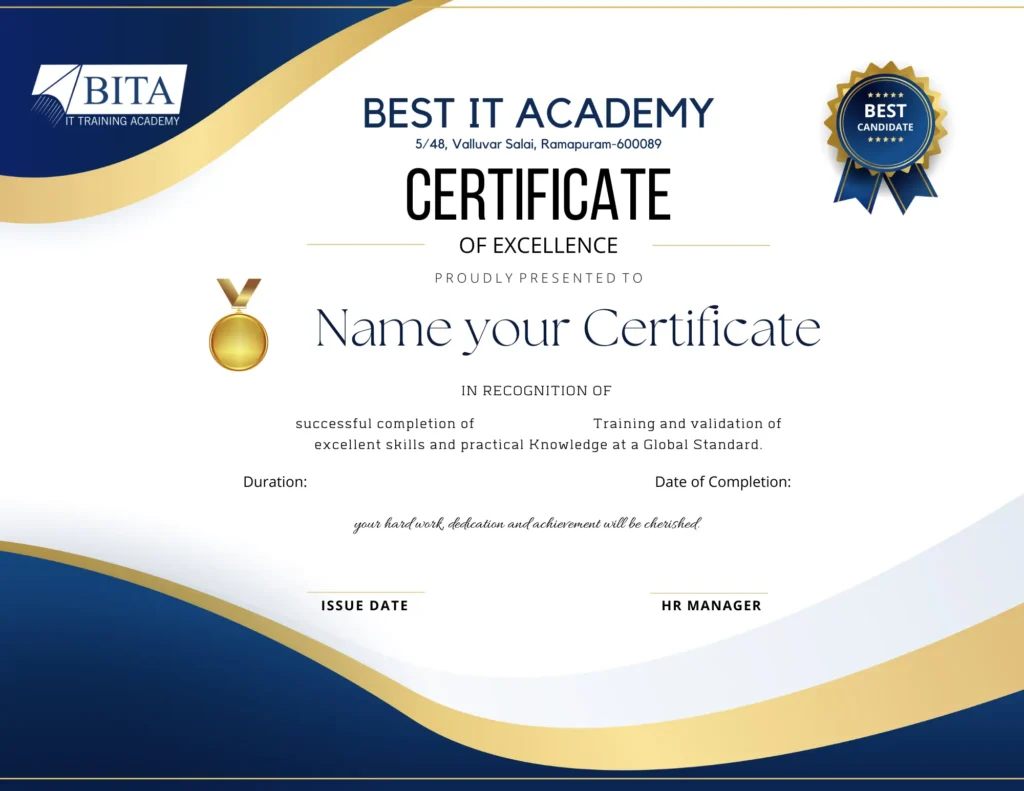Safeguard systems and networks with cutting-edge Cyber Security skills
Cyber Security Training in Chennai
Welcome to Internet safety. By enrolling in our Cyber Security Training in Chennai, individuals can embark on a rewarding and significant career focused on safeguarding digital assets from various cyber threats. Due to the increasing interconnectedness of the global landscape, the incidence of cyberattacks is rising. The circumstances above amplify the demand for professionals specializing in the field of cybersecurity. This course will equip you with the necessary skills and knowledge to attain certification as a cybersecurity professional.
Cybersecurity safeguards computer systems, networks, and digital resources from unauthorized access, data breaches, and malicious intrusions. The subject matter spans various essential domains, such as network security, application security, information security, and cloud security.
Cyber Security Training in Chennai
Welcome to Internet safety. By enrolling in our Cyber Security Training in Chennai, individuals can embark on a rewarding and significant career focused on safeguarding digital assets from various cyber threats. Due to the increasing interconnectedness of the global landscape, the incidence of cyberattacks is rising. The circumstances above amplify the demand for professionals specializing in the field of cybersecurity. This course will equip you with the necessary skills and knowledge to attain certification as a cybersecurity professional.
What is cybersecurity?
Cybersecurity safeguards computer systems, networks, and digital resources from unauthorized access, data breaches, and malicious intrusions. The subject matter spans various essential domains, such as network security, application security, information security, and cloud security.
Roles and Responsibilities in Cyber Security
The roles and responsibilities within this particular domain encompass a wide range of tasks that are of utmost importance in ensuring the preservation of data and systems’ confidentiality, integrity, and availability.
- Security analysts are responsible for overseeing the security architecture of a business, evaluating potential threats, and implementing measures to minimize risks. The individual’s duties encompass the identification of incidents, the implementation of appropriate responses, and the upkeep of security rules.
- Security engineers are responsible for the design and implementation of various security measures, including but not limited to firewalls, encryption protocols, and access controls. They ensure that systems are strengthened against cyber threats.
- A penetration tester, often an ethical hacker, evaluates an organization’s systems by actively seeking to exploit identified flaws. The primary function of these individuals is to proactively detect vulnerabilities in a system or network, thereby preempting potential exploitation by evil hackers.
- A security consultant is a professional who offers specialized guidance to enterprises on enhancing their security stance. One potential responsibility they may undertake is the execution of risk assessments, formulation of security strategies, and provision of recommendations for possible remedies.
- The Chief Information Security Officer (CISO) is a senior executive who holds the responsibility of supervising and managing the comprehensive security program of a firm. The individuals in question are responsible for the establishment of security policies, the management of security teams, and the enforcement of regulatory compliance.
- Security administration involves the management and maintenance of security systems, such as firewalls and intrusion detection systems. These administrators are responsible for configuring these systems to safeguard against potential threats effectively.
Cybersecurity safeguards computer systems, networks, and digital resources from unauthorized access, data breaches, and malicious intrusions. The subject matter spans various essential domains, such as network security, application security, information security, and cloud security.
The roles and responsibilities within this particular domain encompass a wide range of tasks that are of utmost importance in ensuring the preservation of data and systems’ confidentiality, integrity, and availability.
- Security analysts are responsible for overseeing the security architecture of a business, evaluating potential threats, and implementing measures to minimize risks. The individual’s duties encompass the identification of incidents, the implementation of appropriate responses, and the upkeep of security rules.
- Security engineers are responsible for the design and implementation of various security measures, including but not limited to firewalls, encryption protocols, and access controls. They ensure that systems are strengthened against cyber threats.
- A penetration tester, often an ethical hacker, evaluates an organization’s systems by actively seeking to exploit identified flaws. The primary function of these individuals is to proactively detect vulnerabilities in a system or network, thereby preempting potential exploitation by evil hackers.
- A security consultant is a professional who offers specialized guidance to enterprises on enhancing their security stance. One potential responsibility they may undertake is the execution of risk assessments, formulation of security strategies, and provision of recommendations for possible remedies.
- The Chief Information Security Officer (CISO) is a senior executive who holds the responsibility of supervising and managing the comprehensive security program of a firm. The individuals in question are responsible for the establishment of security policies, the management of security teams, and the enforcement of regulatory compliance.
- Security administration involves the management and maintenance of security systems, such as firewalls and intrusion detection systems. These administrators are responsible for configuring these systems to safeguard against potential threats effectively.
Get Instant Help Here
Acquiring pertinent certificates is imperative to substantiating one’s proficiency and progressing on a professional trajectory within the field of cyber security. Several certifications are considered noteworthy. Sign up for cyber security training in Chennai.
- CISSP Training in Chennai: The Certified Information Systems Security Professional is an internationally recognized credential encompassing various security subjects.
- CEH Training in Chennai: The Certified Ethical Hacker certification focuses on using ethical hacking techniques to find security holes and check how well security solutions work.
- CISM Training in Chennai: The Certified Information Security Manager CISM certification is specifically tailored for individuals who hold positions in the field of information security management.
- CISA Training in Chennai: The Certified Information Systems Auditor certification places significant emphasis on the control, audit, and assurance of information systems.
- CompTIA Security+ Training in Chennai: The CompTIA Security+ certification is designed to provide individuals with an introductory knowledge and understanding of fundamental security topics.
- CCSP Training in Chennai: The Certified Cyber Security Professional certification focuses on the field of cloud security and is specifically applicable to individuals who are employed in cloud-based systems.

The need for specialists in the field of cyber security is experiencing a consistent increase due to enterprises placing a higher emphasis on safeguarding their digital infrastructure. Cyber security offers various employment prospects, spanning multiple industries such as finance, healthcare, government, and technological corporations. Cyber security training in Chennai helps those interested in this sector learn the skills and information they need. Cyber security training in Chennai provides ethical hacking, network security, and information security management to equip you for cybersecurity concerns. Cybersecurity jobs in India pay an average of ₹5,000,000 a year. Starting salaries range from ₹37,564 to ₹40,765 per month on average. Cybersecurity analysts in India make between ₹2.8 lakhs and ₹12.0 lakhs a year on average. IT security engineers in India make between ₹2.8 lakhs and ₹18.0 lakhs a year on average.
Job you can land with Cyber Security
What you will learn?
- What is Cyber Security
- Overview
- Need and Importance
- Different verticals
Security and Risk Management
- Regulatory and legal issues
- Availability, Confidentiality, and concepts like integrity
- Principles of security governance
- Compliance and professional ethics
- Requirements of business continuity
- Policies of personnel security
- Security education, awareness, and training
- Security policies, standards, procedures, and guidelines
Asset Security
- Privacy protection
- Asset and information classification
- Data security controls and appropriate retention
- Requirements handling
Security Architecture and Engineering
- Security evaluation models
- Fundamental concepts of security models
- Security designs, architectures, and solution elements vulnerabilities
- Information systems security capabilities
- Using secure design principles for engineering processes
- Vulnerabilities of web-based and mobile systems
- Vulnerabilities of cyber-physical systems and embedded devices
- Secure principles of facility and site design
- Physical security
Communication and Network Security
- Architectural design of a secure network
- Channels for secure communication
- Components of a secure network
- Network attacks
Identity and Access Management (IAM)
- Logical/physical access to assets management
- Authentication and identification management
- Integrating identity as a third-party service
- Mechanism of authorization
- Provisioning life cycle’s identity and access
Security Assessment and Testing
- Test outputs (e.g., manual and automated)
- Security process data (e.g., operational and management controls)
- Vulnerabilities of security architectures
- Testing of security control
- Test and assessment strategies
Security Operations
- Monitoring and logging activities
- Investigation requirements and support
- Incident management
- Resource provision
- Concepts of foundational security operations
- Recovery strategies
- Techniques of resource protection
- Measures of prevention
- Vulnerability and patch management
- Processes of change management
- Exercises and planning of business continuity
- Personnel safety concerns
- Plans and processes for disaster recovery
Software Development Security
- Security controls for the development environment
- Software development life cycle security
- Impact of acquired software security
- Effectiveness of software security
Weekdays
Mon-Fri
Online/Offline
1 hour
Hands-on Training
Suitable for Fresh Jobseekers
/ Non IT to IT transition
Weekends
Sat – Sun
Online/Offline
1.30 – 2 hours
Hands-on Training
Suitable for IT Professionals
Batch details
Week days
Mon-Fri
Online/Offline
1 hour
Hands-on Training
/ Non IT to IT transition
Sat – Sun
Online/Offline
1:30 – 2 hours
Hands-on Training
Why should you select us?






Why should you select Us?





















